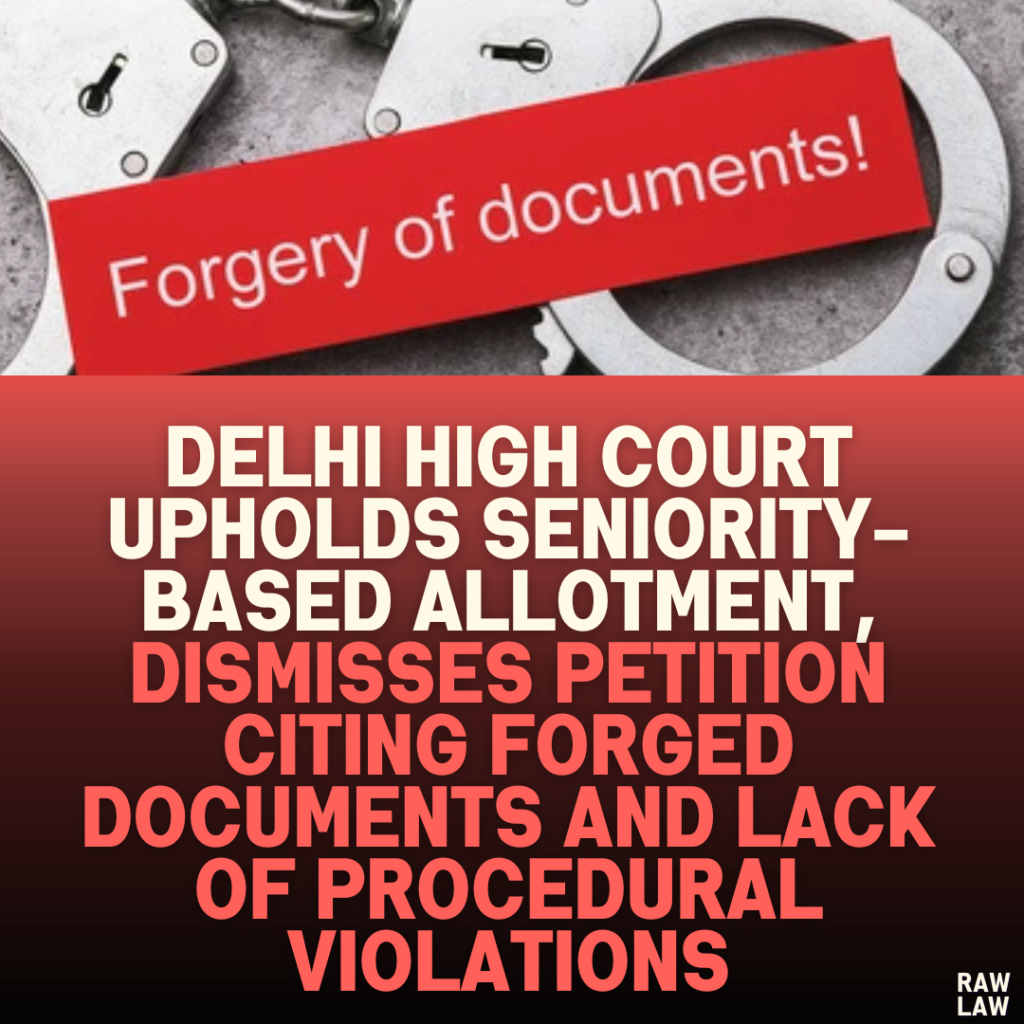Court’s Decision: The Delhi High Court dismissed the writ petition, upholding the seniority-based allotment of plots by the Registrar of Cooperative Societies (RCS) in favor of Respondent No. 5, concluding that the petitioner’s claims lacked merit due to evidence of document manipulation and procedural impropriety. The court found no merit in the petitioner’s arguments regarding alleged violations of natural justice and rejected the petition on the grounds of approaching the court with “unclean hands.”
Facts of the Case:
- The petitioner’s mother, Smt. Surjeet Kaur, had applied for membership in the Hindustan Cooperative House Building Society in 1973. Despite initial non-payment issues, her membership was transferred to the petitioner in 1982.
- The RCS prepared a seniority list in 2000, placing the petitioner at the top. However, due to subsequent investigations, it was found that certain records may have been manipulated, leading to the contested allotment of a plot to Respondent No. 5, who ranked lower on the initial list.
- The petitioner challenged the allotment, asserting priority based on seniority and alleging procedural irregularities in the RCS’s decision-making.
Issues:
- Whether the petitioner’s claim to seniority was valid despite alleged document manipulation.
- Whether the petitioner’s right to a fair hearing was compromised.
- Whether the allotment process complied with natural justice principles.
Petitioner’s Arguments:
- The petitioner argued that membership should be counted from 1973 when his mother first applied, entitling him to a higher rank on the seniority list. He also contended that due process was not followed, as he was not provided adequate opportunity to argue his case due to illness and that essential investigation reports were withheld.
- Citing precedent, he argued that membership seniority should not rely on payment dates but rather the original application date.
Respondent’s Arguments:
- The respondents contended that the petitioner’s claim was based on forged documents, as revealed by the Crime Branch inquiry. They argued that since Respondent No. 5’s membership was legitimate and uncontested, the allotment was justified.
- They further argued that any procedural lapses cited by the petitioner were invalid as the petitioner was adequately represented throughout the proceedings.
Analysis of the Law:
- The court examined the principles of natural justice, focusing on whether the petitioner was provided adequate opportunity to present his case.
- The legal analysis included the validity of claims based on forged or manipulated documents, referencing procedural integrity within cooperative societies.
Precedent Analysis:
- The court referenced S.K. Gambhir vs. Union of India, wherein membership seniority was not deemed to depend on payment dates. However, the court distinguished this case, finding no support in the petitioner’s arguments due to the established manipulation of records.
Court’s Reasoning:
- The court emphasized that the Inquiry Report from the Crime Branch substantiated the RCS’s actions, showing that the petitioner’s documents were likely forged and manipulated.
- It highlighted that the petitioner’s non-cooperation in previous hearings weakened his case, affirming that procedural violations alleged by the petitioner were not substantiated.
Conclusion:
- The court concluded that the petitioner’s claim lacked merit due to discrepancies in membership documentation and dismissed the petition. The petitioner’s assertions of seniority could not be substantiated, given the evidence of document manipulation.
- The court also found that procedural lapses alleged by the petitioner did not hold as the proceedings adhered to due process norms.
Implications:
- This judgment underscores the necessity for integrity and transparency in cooperative society records and emphasizes that judicial bodies will not tolerate forged documents in claims of seniority or membership.
- It also highlights the court’s reliance on detailed inquiry reports to affirm administrative decisions, reinforcing the precedence of procedural correctness and compliance with natural justice.




Pingback: Delhi High Court Upholds Conviction under Section 138 of the NI Act: Petitioner's Failure to Rebut Presumed Debt with Substantial Evidence Leads to Upheld Sentence - Raw Law